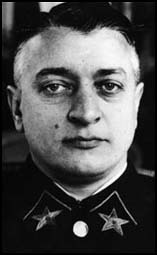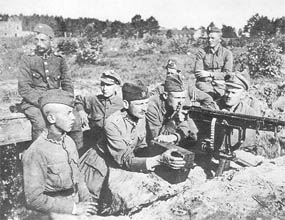معركة وارسو (1920)
| معركة وارسو | |||||||
|---|---|---|---|---|---|---|---|
| جزء من الحرب الپولندية السوڤيتية | |||||||
 | |||||||
| |||||||
| المتحاربون | |||||||
|
|
| ||||||
| القادة والزعماء | |||||||
|
|
| ||||||
| القوى | |||||||
| 113,000–123,000[1] | 104,000–140,000[1] | ||||||
| الضحايا والخسائر | |||||||
|
4,500 dead 22,000 wounded 10,000 missing[1] Total: 36,500 |
15,000–25,000 dead unknown number of wounded 65,000–66,000 captured 30,000–35,000 interned في پروسيا الشرقية[1][2] Total: 110,000–126,000 | ||||||
معركة وارسو refers to the decisive Polish victory in 1920 at the apogee of the الحرب الپولندية السوڤيتية. پولندا، on the verge of total defeat, repulsed and defeated the invading Red Army. It was, and still is, celebrated as a great victory for the Polish people over روسيا و الشيوعية.
As Soviet forces invaded Poland in summer 1920, the Polish army retreated westward in disorder. The Polish forces seemed on the verge of disintegration and observers predicted a decisive Soviet victory.
The battle of Warsaw was fought from August 12–25, 1920 as Red Army forces commanded by Mikhail Tukhachevsky approached the Polish capital of Warsaw and the nearby Modlin Fortress. On August 16, Polish forces commanded by Józef Piłsudski counterattacked from the south, disrupting the enemy's offensive, forcing the Russian forces into a disorganized withdrawal eastward and behind the Neman River. Estimated Russian losses were 10,000 killed, 500 missing, 30,000 wounded, and 66,000 taken prisoner, compared with Polish losses of some 4,500 killed, 10,000 missing, and 22,000 wounded.
The defeat crippled the Red Army; Vladimir Lenin, the Bolshevik leader, called it "an enormous defeat" for his forces.[3] In the following months, several more Polish follow-up victories saved Poland's independence and led to a peace treaty with Soviet Russia and Soviet Ukraine later that year, securing the Polish state's eastern frontiers until 1939.
نسق القتال
Polish
Battle plans
Polish

Russian

المعركة
الطور الأول
انظر أيضاً
- Blue Army
- Siege of Warsaw (1939)
- Stefan Mazurkiewicz
- Battle of Warsaw 1920, a 2011 film by Jerzy Hoffman
الهامش والمراجع
- ^ أ ب ت ث Szczepański, Janusz. "Kontrowersje Wokół Bitwy Warszanskiej 1920 Roku". Mówią Wieki (in البولندية). Archived from the original (Controversies surrounding the Battle of Warsaw in 1920) on 14 May 2008. Retrieved 2008-05-12.
{{cite web}}: Unknown parameter|deadurl=ignored (|url-status=suggested) (help) - ^ Soviet casualties refer to all the operations during the battle, from the fighting on the approaches to Warsaw, through the counteroffensive, to the battles of Białystok and Osowiec, while the estimate of Red Army strength may be only for the units that were close to Warsaw, not counting the units held in reserve that took part in the later battles.
- ^ Sketches from a Secret War by Timothy Snyder, Yale University Press, 2007, p. 11
خطأ استشهاد: الوسم <ref> ذو الاسم "Adam Bruno Ulam" المُعرّف في <references> غير مستخدم في النص السابق.
خطأ استشهاد: الوسم <ref> ذو الاسم "Bury" المُعرّف في <references> غير مستخدم في النص السابق.
خطأ استشهاد: الوسم <ref> ذو الاسم "Cisek" المُعرّف في <references> غير مستخدم في النص السابق.
خطأ استشهاد: الوسم <ref> ذو الاسم "Davies_WERS-29" المُعرّف في <references> غير مستخدم في النص السابق.
خطأ استشهاد: الوسم <ref> ذو الاسم "Dparker" المُعرّف في <references> غير مستخدم في النص السابق.
خطأ استشهاد: الوسم <ref> ذو الاسم "Erickson" المُعرّف في <references> غير مستخدم في النص السابق.
خطأ استشهاد: الوسم <ref> ذو الاسم "Lawrynowicz" المُعرّف في <references> غير مستخدم في النص السابق.
خطأ استشهاد: الوسم <ref> ذو الاسم "Lukowski" المُعرّف في <references> غير مستخدم في النص السابق.
خطأ استشهاد: الوسم <ref> ذو الاسم "Musialik" المُعرّف في <references> غير مستخدم في النص السابق.
خطأ استشهاد: الوسم <ref> ذو الاسم "Odziemkowski" المُعرّف في <references> غير مستخدم في النص السابق.
خطأ استشهاد: الوسم <ref> ذو الاسم "PWN:wojna" المُعرّف في <references> غير مستخدم في النص السابق.
خطأ استشهاد: الوسم <ref> ذو الاسم "Wandycz" المُعرّف في <references> غير مستخدم في النص السابق.
<ref> ذو الاسم "milhist44" المُعرّف في <references> غير مستخدم في النص السابق.للاستزادة
- Biskupski M. B. "Paderewski, Polish Politics, and the Battle of Warsaw, 1920," Slavic Review (1987) 46#3 pp. 503–512 he was trying to get American support for his comeback in Polish politics in JSTOR
- Edgar Vincent D'Abernon, The Eighteenth Decisive Battle of the World: Warsaw, 1920, Hyperion Press, 1977, ISBN 0-88355-429-1.
- Davies, Norman. White Eagle, Red Star: the Polish–Soviet War, 1919–20, Pimlico, 2003, ISBN 0-7126-0694-7.
- Davies, Norman. "The Soviet Command and the Battle of Warsaw," Soviet Studies (1972) 23#4 pp. 573–585 says the Soviet failure of command was responsible for its defeat
- Fiddick, Thomas. "The 'Miracle of the Vistula': Soviet Policy versus Red Army Strategy," Journal of Modern History (1973) 45#4 pp. 626–643 in JSTOR
- Fuller, J.F.C.. The Decisive Battles of the Western World, Hunter Publishing, ISBN 0-586-08036-8.
- Hetherington, Peter. Unvanquished: Joseph Pilsudski, Resurrected Poland, and the Struggle for Eastern Europe (2012) pp 425–58 excerpt and text search
- Watt, Richard M. Bitter Glory: Poland and Its Fate, 1918–1939, Hippocrene Books, 1998, ISBN 0-7818-0673-9.
- Zamoyski, Adam. Warsaw 1920: Lenin's Failed Conquest of Europe (2008) excerpt and text search
بالپولندية
- M. Tarczyński, Cud nad Wisłą, Warszawa, 1990.
- Józef Piłsudski, Pisma zbiorowe, Warszawa, 1937, reprinted by Krajowa Agencja Wydawnicza, 1991, ISBN 83-03-03059-0.
- Mikhail Tukhachevski, Lectures at Military Academy in Moscow, February 7–10, 1923, reprinted in Pochód za Wisłę (March across the Vistula), Łódź, 1989.
وصلات خارجية
- Robert Szymczak, Polish–Soviet War: Battle of Warsaw, Historynet
- 3 scans Polish maps
- (Polish) "Bolszewik złamany Gazeta Wyborcza article about breaking of Soviet ciphers.






